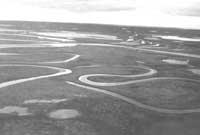Methane and greenhouse effect
Climate models indicate that tundras from Canada and Siberia will heat over the next few decades more than any other area of the world. Frozen coal will release large amounts of methane when melted.

Methane is the second greenhouse gas, behind carbon dioxide. Permafrost is the biggest methane trap produced by swamp animals. Release of methane will increase average warming.
There is currently no data on the amount of methane trapped in the tundra of Siberia and Canada, nor on the annual amount being released. However, according to some, permafrost covered territories in Canada have declined in the last 20 years.
The concentration of methane in the air is increasing by 1% annually, faster than the growth rate of carbon dioxide. The main sources of methane are flooded rice paddies, ruminant winds, coal mines and landfills.





